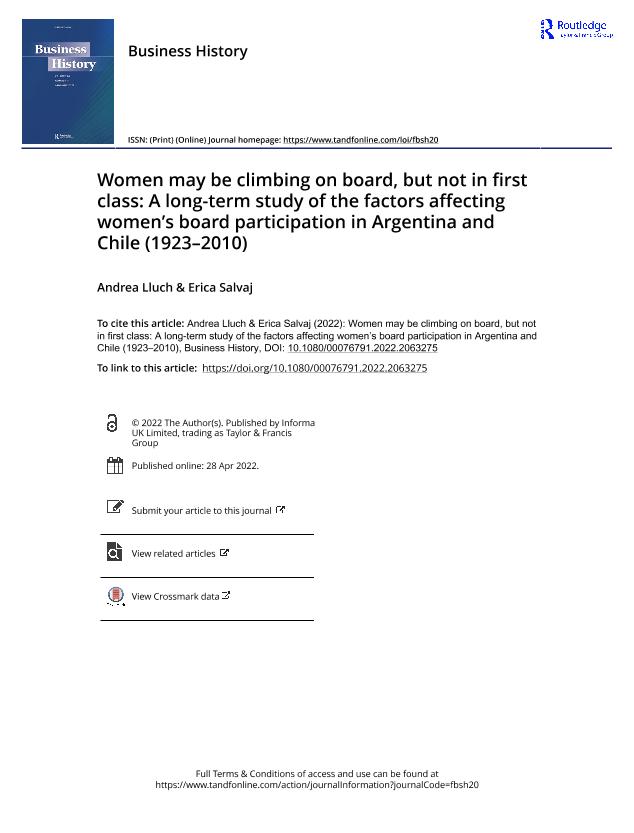Mostrar el registro sencillo del ítem
dc.contributor.author
Lluch, Andrea Mari

dc.contributor.author
Salvaj, Erica

dc.date.available
2023-10-02T13:06:19Z
dc.date.issued
2022-04
dc.identifier.citation
Lluch, Andrea Mari; Salvaj, Erica; Women may be climbing on board, but not in first class: A long-term study of the factors affecting women’s board participation in Argentina and Chile (1923–2010); Routledge Journals, Taylor & Francis Ltd; Business History; 4-2022; 1-28
dc.identifier.issn
0007-6791
dc.identifier.uri
http://hdl.handle.net/11336/213751
dc.description.abstract
The literature about women’s roles in corporate structure does not provide clear, systemic, integrative answers to fundamental questions such as which factors shape board gender composition and women’s roles in business and corporate networks? With the intention to help overcome this gap in the literature, this paper examines the dynamics of women’s access to corporate boards for more than a century in Argentina and Chile. It focuses on critical factors that affect the fluctuating, nonlinear recruitment patterns that have led to the incorporation of women in these two countries during the twentieth century and the first decade of the twenty-first century. We analyse a diverse range of institutional, organisational, and individual factors that have opened women’s access to the boards of Argentina’s and Chile’s largest corporations. The study establishes that Argentina has progressed into a more fragmented corporate network than Chile, which may have facilitated women’s access to boards. However, and even if, little by little, a combination of factors has opened some space for women in the corporate power elite, they primarily remain in marginalised positions in networks. Taken together, these findings show that it is important to consider not only the number and the timing but also the nature of women’s integration into corporate boards and high-ranking positions. This issue is particularly relevant because Argentina and Chile have not enacted regulations to mandate minimum levels of board diversity during the period under analysis.
dc.format
application/pdf
dc.language.iso
eng
dc.publisher
Routledge Journals, Taylor & Francis Ltd

dc.rights
info:eu-repo/semantics/openAccess
dc.rights.uri
https://creativecommons.org/licenses/by-nc-nd/2.5/ar/
dc.subject
ARGENTINA
dc.subject
CHILE
dc.subject
CORPORATE NETWORK
dc.subject
CORPORATE POWER STRUCTURE
dc.subject
ELITES
dc.subject
FAMILY BUSINESS
dc.subject
MULTINATIONALS
dc.subject
WOMEN DIRECTORS
dc.subject.classification
Otras Humanidades

dc.subject.classification
Otras Humanidades

dc.subject.classification
HUMANIDADES

dc.title
Women may be climbing on board, but not in first class: A long-term study of the factors affecting women’s board participation in Argentina and Chile (1923–2010)
dc.type
info:eu-repo/semantics/article
dc.type
info:ar-repo/semantics/artículo
dc.type
info:eu-repo/semantics/publishedVersion
dc.date.updated
2023-06-26T11:14:34Z
dc.journal.pagination
1-28
dc.journal.pais
Reino Unido

dc.journal.ciudad
Londres
dc.description.fil
Fil: Lluch, Andrea Mari. Universidad Nacional de la Pampa. Facultad de Ciencias Humanas. Instituto de Estudios Históricos y Sociales de La Pampa. - Consejo Nacional de Investigaciones Científicas y Técnicas. Centro Científico Tecnológico Conicet - Patagonia Confluencia. Instituto de Estudios Históricos y Sociales de La Pampa; Argentina. Universidad de los Andes; Colombia
dc.description.fil
Fil: Salvaj, Erica. Universidad de San Andrés; Argentina. Universidad del Desarrollo; Chile
dc.journal.title
Business History

dc.relation.alternativeid
info:eu-repo/semantics/altIdentifier/url/https://www.tandfonline.com/doi/full/10.1080/00076791.2022.2063275
dc.relation.alternativeid
info:eu-repo/semantics/altIdentifier/doi/http://dx.doi.org/10.1080/00076791.2022.2063275
Archivos asociados
